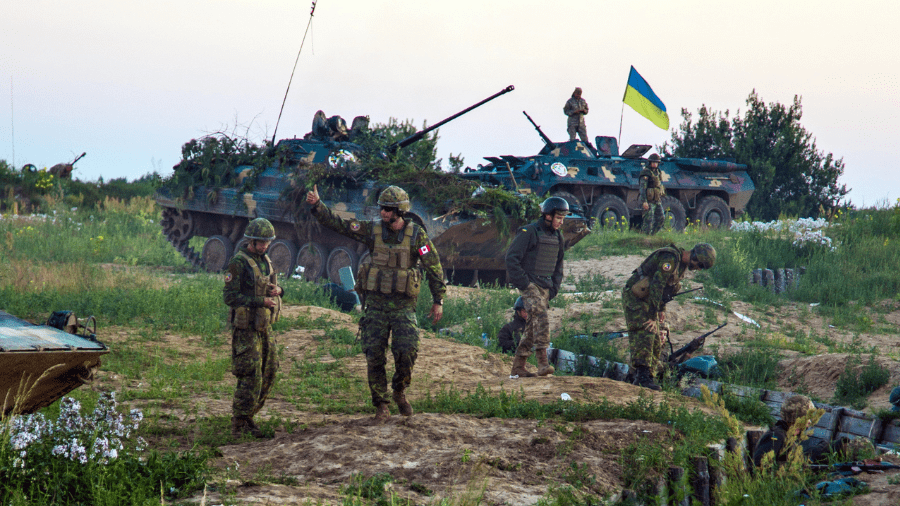This article originally appeared in the National Post.
By Balkan Devlen and Jonathan Berkshire Miller, July 5, 2023
Transatlantic allies will be meeting in Vilnius, Lithuania, on July 11 and 12 for a NATO summit as Russia’s war in Ukraine continues. The meeting will also take place just weeks after one of the most bizarre episodes in recent Russian history — the failed mutiny/rebellion/attempted coup by ex-convict and head of Wagner mercenaries Yevgeny Prigozhin.
There are several themes likely to be discussed at the summit, from enshrining the principle of two per cent of GDP for defence spending as a minimum rather than an aspirational ceiling for alliance members, to the nature of the threat that China poses to the security and prosperity of the organization.
But the attention of the world surely remains on the question of Ukraine’s future membership in NATO.
On this question the choice is clear. Canada must not falter in its support for Ukraine. Ottawa must throw its weight behind a fast-track NATO membership for Ukraine after the war ends. This action, a deviation from the traditional membership action plan, is a necessary response given the high stakes and the fact that the Ukrainian military continually proves itself to be a capable fighting force that any alliance would be lucky to have.
Not only will fast-tracking Ukraine’s NATO membership signal our unwavering commitment to “stand with Ukraine as long as it takes,” as Prime Minister Justin Trudeau keeps reminding us, it will also serve as a significant deterrent against further aggression by Russia after the war.
Frankly put, the critics of NATO enlargement got it wrong. It was the failure of NATO to extend membership to Ukraine in the 2008 Bucharest summit that enabled the Russian invasion in 2014, not vice versa. We can’t make the same mistake again.
Rather than dithering and taking a “wait-and-see” approach, Canada should also advocate for a robust and empowered NATO-Ukraine Council, which will be announced at the Vilnius summit. Such a structure would allow Ukraine to become deeply integrated in NATO’s structures as much as possible. This council should be more than a symbolic entity — it should be an active, operational platform for co-operation and support for Ukraine until its eventual membership.
In addition, Canada needs to call for the termination of the NATO-Russia Founding Act of 1997. This act has become obsolete in the face of Russia’s behaviour in the past decade, which culminated in the full-scale invasion of Ukraine in 2022. Its dissolution will enable the process of permanently stationing NATO troops in the Eastern flank, including the Baltics and Poland, to begin. Canada should also demonstrate its commitment by expanding and making its Latvia mission a permanent brigade-size deployment, thereby bolstering NATO’s Eastern flank.
Political will and stamina in the West are key uncertainties in how this war will unfold in the coming months. We must ensure that Ukraine is not left vulnerable to the changing winds of domestic politics during its transitional phase into NATO. To this end, Canada should join its willing allies and articulate clear security commitments to Ukraine until its full NATO membership after the war. The specific nature of these commitments can be discussed either bilaterally with Ukraine or preferably in a mini lateral setting with a “coalition of the willing” within NATO.
While we take steps to support Ukraine in the present, we must also assure Ukrainians of a secure future. At the Washington summit next year, when NATO celebrates its 75th anniversary, Canada should push for a clear timeline for Ukraine’s full membership. Setting a definitive course will dispel any doubts and convey our firm commitment to Ukraine’s rightful place within NATO.
Lastly, it is crucial that we boost our commitments and support for Ukraine. This includes not only diplomatic and military efforts but also economic ones. Encouraging investments by private Canadian companies in Ukraine, in partnership with Ukrainian businesses, can foster mutual prosperity and further strengthen the bonds between our nations. A particularly impactful commitment would be for the Canadian government to create an insurance fund guaranteeing Canadian investments in Ukraine’s defence sector and production. We may not have sufficient stocks of military equipment and ammunition to give to Ukraine but we can enable their production in Ukraine.
To be sure, these steps are not without challenges. Yet the cost of inaction is far greater. Allowing the question of Ukraine’s future in the alliance to slip would embolden Russia, and would also be noted by other authoritarian actors — especially China. Canada must stand at the forefront of this effort, championing Ukraine’s swift integration into NATO. We must remember that supporting Ukraine is not charity but enlightened self-interest for Canada and the rest of the democratic world.
Balkan Devlen is Senior Fellow and the Director of the Transatlantic Program at the Macdonald-Laurier Institute. Jonathan Berkshire Miller is Senior Fellow and the Director of Foreign Affairs, National Defence, and National Security at the Macdonald-Laurier Institute.






